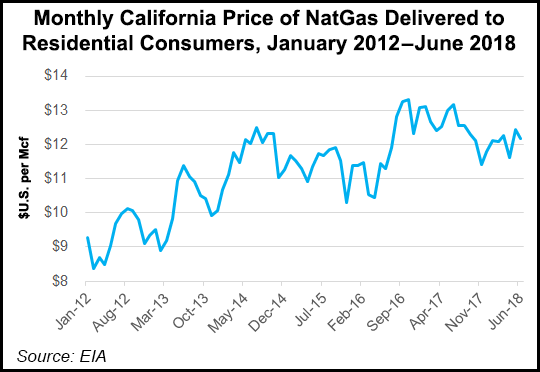Regulatory | Infrastructure | NGI All News Access
California Urged to Lower Gas for Generation Penalties During Heat Waves
California power and natural gas officials agree there need to be modifications to penalties imposed on gas-fired generators during heat wave-driven peak demand periods, particularly in Southern California, where gas storage options are limited.

In a recent filing to the California Public Utilities Commission (CPUC), Southern California Edison Co. (SCE) and the Southern California Generation Coalition (SCGC) requested that penalties be temporarily lowered from $25/Dth to $5/Dth in order to avoid unnecessary price spikes for natural gas and electricity during heat waves.
The California Independent System Operator (CAISO) also filed with the CPUC to raise concerns about Operational Flow Order (OFO) noncompliance penalties, and to urge state regulators to “carefully consider” the potential impacts on reliability from lowering the penalties.
In recent heat waves in Southern California, an increase in system congestion and congestion costs occurred due in part to the state grid operator’s day-ahead market response to increased gas prices in the SoCalGas system, CAISO said in its filing.
Utilities and regulators have recognized that financial penalties imposed on natural gas shippers that disrupt the system balance can drive up market gas and electric prices, so the SCE-SCGC proposal appears to have merit.
CAISO said that in recent years it has “made significant improvements to its markets and operations to ensure that the electric and gas systems are better coordinated. Frequent use of OFO procedures can result in sub-optimal coordination, despite [stakeholders’] best efforts.”
For CAISO, the bottom line is that frequent OFO usage should not be “a substitute for a well-functioning gas system.”
CAISO reiterated to the CPUC the need for “continued close coordination” to better optimize gas use for electrical generation, “especially in circumstances where natural gas storage opportunities are limited and pipeline outages continue to limit gas supply.”
In its filing, CAISO said it plans to continue working with the CPUC to “ensure the gas and electric systems work in coordination to the greatest extent possible” as the Federal Energy Regulatory Commission has been advocating on a national basis for several years.
© 2024 Natural Gas Intelligence. All rights reserved.
ISSN © 1532-1231 | ISSN © 2577-9877 |
